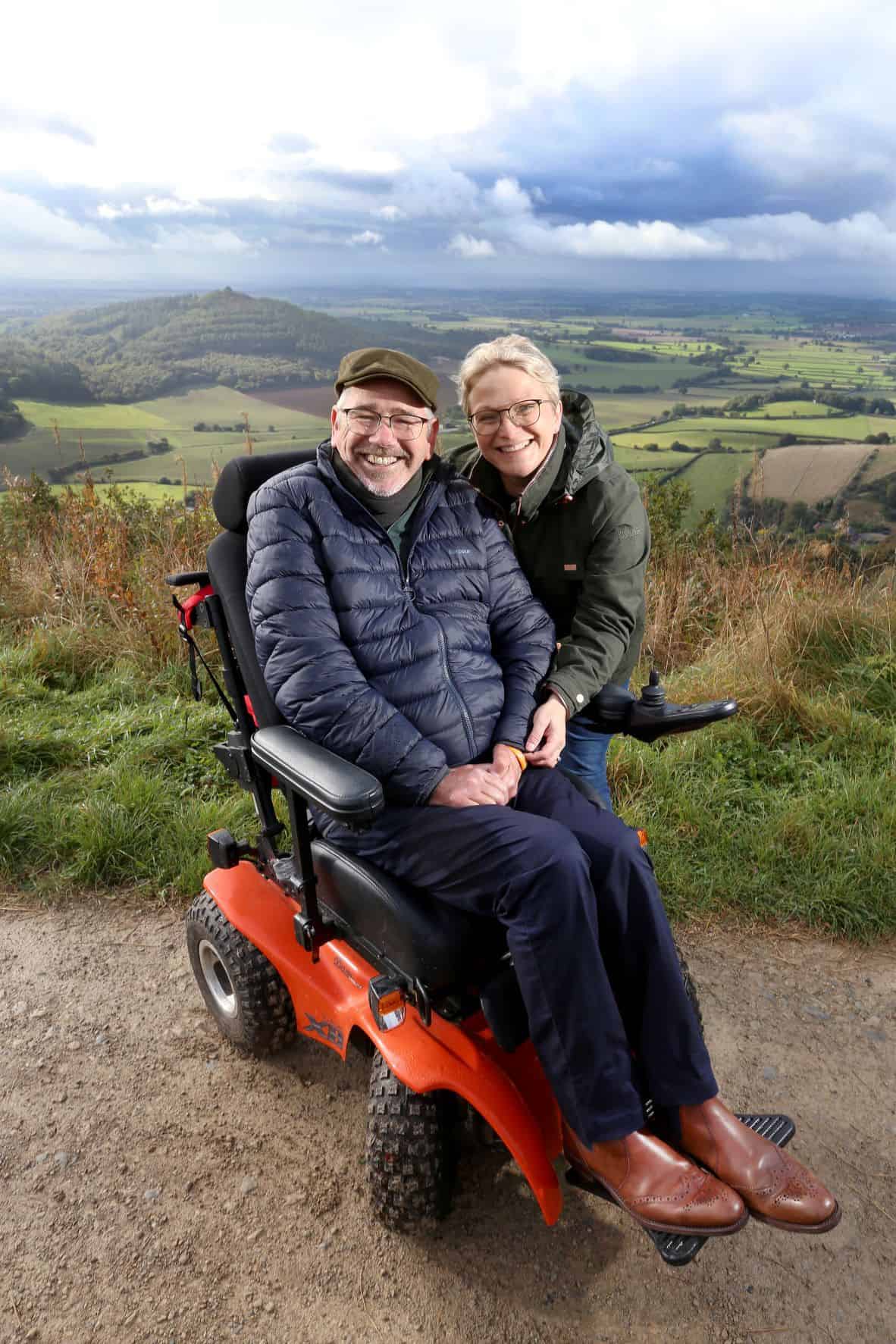A man diagnosed with terminal Motor Neurone Disease (MND) is courageously taking on a 100-mile challenge, despite the physical challenges, in support of Leeds Hospitals Charity.
Ian Flatt, 56, has already completed a 100-mile walk raising £17,500 for charity. The York man has committed to another 100-mile challenge, despite needing a respirator for 16 hours a day.
The walk which crosses the North York Moors and the Yorkshire Wolds starts at the Sutton Bank National Park Centre on Tuesday 12 October, in support of Leeds Hospitals Charity £5m appeal to build the new Rob Burrow Centre for Motor Neurone Disease in Leeds.
Cause UK is proud to provide media support to Ian and the Leeds Hospitals Charity. Highlights so far include Sky News, BBC Look North, Leeds Community TV, ITV Calendar and the Yorkshire Post.

Ian said: “I was inspired to take on another 100-mile challenge to support this important appeal, spearheaded by Rob and his family. Such a facility would make a vital difference to people like me and our loved ones. A bespoke care centre that meets the needs of MND sufferers and their families is so needed as MND is such a cruel disease.”
Ian, who is supported by his wife Rachael and two daughters, was diagnosed with MND in early 2019.
Ian said: “The walk earlier this year was so exhilarating, it was one of the best times of my life, it was just so beautiful. It gave me a huge sense of purpose and positivity to receive such support from the public, and raise over £17k for charities. I hope to reach a similarly impressive figure this time round.”
Ian will complete the 100-mile challenge in a series of 18 walks which include some of his favourite trails around the Hole of Horcum, Rievaulx Moor, Thixendale and finishing with a trek around the dramatic Sutton Bank escarpment. Ian hopes to complete the 100-mile challenge over a four-week period.
The appeal for a new state-of-of-the-art purpose-built care centre of excellence for those living in and around the Leeds area is backed by the Leeds Rhinos player, who was diagnosed with MND in late 2019, aged 37. Rob Burrow, and Ian, are both cared for at Seacroft Hospital, where the MND centre is currently based.
The current centre, built in the early 20th century, is now showing its age. A state-of-the-art new build is needed for the advanced technology in patient care. Patients will also have access to a range of holistic support tailored to their needs, from speech and language therapy, to diet and nutrition advice, and physiotherapy.
Ian said: “Motor Neurone Disease is a disease for which there is no treatment or cure, with 50% of sufferers sadly dying within the first two years of diagnosis. Thanks to the critical help, compassion, expertise and kindness provided by the specialist MND Team in Leeds, my family and I have maintained our sense of fun, and our wonderful ability to laugh with each other. Whilst my mobility, dexterity and respiratory functions are failing, my sense of adventure remains intact.”
Esther Wakeman, Chief Executive of Leeds Hospitals Charity hopes the new centre will provide a space for patients and their loved ones to enjoy special moments together and spark a change to MND care across the nation.
She said: “I can envisage our centre becoming a flagship in the UK and I hope that this will inspire others to replicate this up and down the country, offering thousands of MND sufferers the best quality of life and help us get closer to finding a cure one day. Ian is a tremendous inspiration to all of us, and we will cheer him on every step of his 100-mile challenge.”
To donate go to: https://leedshospitalscharity.enthuse.com/pf/ian-flatt

About Motor Neurone Disease (MND)
Motor neurone disease (MND) affects the nerves – called motor neurones – in the brain and spinal cord. MND is a life-shortening disease with no cure. Although the disease will progress, symptoms can be managed to help achieve the best possible quality of life.
With MND, messages from the motor neurones gradually stop reaching the muscles. This leads the muscles to weaken, stiffen and waste. MND can affect how you walk, talk, eat, drink and breathe. Some people also experience changes to their thinking and behaviour. However, MND affects everyone differently. Not all symptoms will affect everyone, or in the same order. Symptoms also progress at varying speeds, which makes the course of the disease difficult to predict.
MND can affect adults of any age but is more likely to affect people over 50. There is a 1 in 300 risk of being diagnosed with MND. However, the prevalence of a disease is the number of people currently living with that condition. As the progression of MND can be rapid, fewer people are living with this disease than might be expected with a 1 in 300 risk. This means the prevalence is low, with up to 5,000 people living with MND in the UK at any one time. This is why MND is not seen as a common disease.
Source: MND Association
About Leeds Hospitals Charity
Leeds Hospitals Charity is the charity for Leeds Teaching Hospitals. We support NHS staff to deliver the best care for patients and their families, by raising funds for equipment, services, education and research.
Leeds Hospitals Charity provides support for eight areas which include Leeds General Infirmary, Leeds Children’s Hospital, Leeds Cancer Centre, St James’s University Hospital, Chapel Allerton Hospital, Seacroft Hospital, Wharfdale Hospital and Leeds Dental Institute.
Leeds Hospitals Charity supports NHS staff to deliver the best care for over a million patients and their families each year. Working with local communities, schools and businesses across the city and beyond, each year we provide £5 million in additional funding for Leeds Teaching Hospitals Trust.
https://www.leedshospitalscharity.org.uk/mnd-centre-appeal
Photo credit Lorne Campbell Guzelian Media
